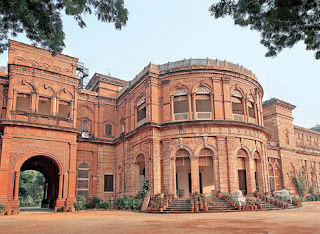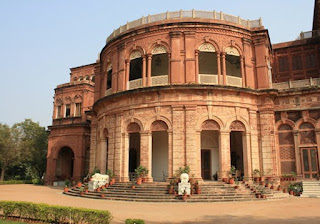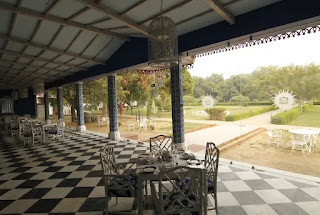There are countless old palatial palaces in Delhi and adjacent areas built by ex princely rulers of India. Though many were built for special purposes for their stay or for the stay of their representatives, some were built in connection with the visit of royal members of the British family. The Dholpur Palace in Dholpur was one among them.
 |
| Raj Niwas Palace/Dholpur palace, Rajasthan .tourmyindia.com |
 |
| Dholpur City Palace, Dholpur. .indiatvnews.com |
Located on a spread of 13 acres of land, the Dholpur Palace was built by the royal members of Jaipur to welcome Albert Edward (later King Edward VII) during his visit to India in 1876. The palace, made of Dholpur red stones is in Dholpur town in the eastern part of Rajasthan flanked by Chambal ravines of Madhya Pradesh on it South east end and covered by Agra on its North west outskirts. close to the state border of Uttar Pradesh. This place and the areas around it were known for natural beauty, unexplored wooded terrain and ample gaming opportunities. No doubt, in the past this area attracted the royal princes to go on hunting trips in the interior portion of the jungles. This place was equally known for illegal sandstone quarries and ravines that were haven for bandits/dacoits. The palace is set in the midst of stately landscaped garden and is close to Dholpur railway station - just one kilometer. This structure, unlike many palaces, stands apart because of its unique architecture and dressed red sandstones widely used in the building. During the tumultuous freedom struggle, this palace was under the care of the English and obviously, it was a silent spectator to so many famous and historical personalities both British and Indian. who had set their foot in this majestic edifice. Truly this palace is the legacy of the Jaipur royal family whose members lived here for several generations.
 |
| Raj Niwas Palace/Dholpur palace, Rajasthan .makemytrip.com/ |
Not many of us aware that that Delhi's Union Public Service Commission ( famously known as UPSC) building (Dholpur House) and Dholpur's Rajniwas Palace were owned by ex ruler Hemant Singh, ex-husband of former Chief Minister of Rajasthan Vasundhara Raje and father of MP Dushyant Singh.
Often referred to as Raj Niwas Palace, it is now a heritage hotel and is being run by Niyant Heritage Hotels Pvt Ltd, owned by Dushyant Singh, son of Vasundhara. The palace hotel is yielding substantial income to the royal family.
 |
| Raj Nivas palace / Dholpur palace .hindustantimes.com |
 |
| .Raj Nivas palace / Dholpur palace makemytrip.com |
For a longtime the Jaipur royal members were embroiled in legal battle that lasted almost 30 long years over the properties owned by the family. In 2015 Jairam Ramesh, a prominent Congress Party leader asserted that ''the Dholpur City Palace is a property of the state that has been usurped illegally," Ramesh thundered on prime-time television. He further accused that CM Raje and her son Dushyant got the property in collusion with former Indian Premier League (IPL) owner Lalit Kumar Modi and converted it into a luxury heritage hotel for illegal profit. However, Jairam Ramesh could not prove his case against the Jaipur royal family as his record was incomplete.
Ex- ruler Hemant's grandmother in the 1950s to avoid estate duty imposed on the heir(s) after the death of her husband Udaibhan finally decided to retain the Dholpur City Palace and offered to swap the property with Kesarbagh Palace, Delhi. This kind of swapping was common among the ex princely families to avoid exorbitant estate duty taxes.
The last king of Dholpur state was king Udaybhan who died at the age of 61. His reign lasted for 43 long years. Hemant Singh, son of Maharaj Pratap Singh was adopted by Udaybhan' wife. Later Hemant Singh became the titular Maharajah of Dholpur in 1954. It was in 1971 Mrs Indira Gandhi, then PM of India, through the amendment to the Indian constitution, abolished the royal titles and privy purses (doles) to the princes given by the Indian government.
The Indian government readily accepted the swapping offered by the Jaipur royal family and the possession took place in 1958. Dholpur City palace was repossessed by the royal family. In 1962 the Rashtriya Military School opened in what was then known as Kesarbagh Palace. ''As per male primogeniture law of succession the Dholpur royals retained the City Palace as absolute owners with full authority to will it''. For unknown reasons, it is not recorded in revenue records. The govt. records were clear regarding Dholpur City palace's title documents and Jairam Ramesh's argument was not supported by proper documentation. So, the court disposed of the case in favor of the royal family.
If you go back on the history of Dholpur, since the time of Mogul period this place has been a center of dispute and conflicts Shahjahan and Nur Jahan vied with each other to control this place. Emperor Jahangir quite unhappy over the conflict in which several people died. finally had sent Shah Jahan to a distant palace.
 |
| birthdaywishes. |
The litigation over the properties between Raje's estranged husband Hemant Singh and son Dushyant Singh went on for a pretty long time - the media called it ''Dholpur battle.'' They spent one third of their precious life in the court case, of course, they had the money to get the litigation going. Finally in 2007 it dawned on the father-son duo that their legal battle was useless and it was something like Sisyphus trying to move a huge boulder up hill. At the fag end in the same year, they made a compromise. Accordingly, Dushyant got the ownership of the palace (Dholpur city palace) in question, a mansion in Shimla, a dozen vintage cars and jewels from Dholpur's treasure, whereas his father got the Delhi properties including a mansion at the Panchsheel Marg.
Dholpur city palace, now a renovated heritage hotel with old splendor and style showcases the past legacy and the opulence of Rajput royal life.
https://www.indiatvnews.com/news/india/dholpur-palace-vasundhara-raje-begum-nurjahaan-52215.html









